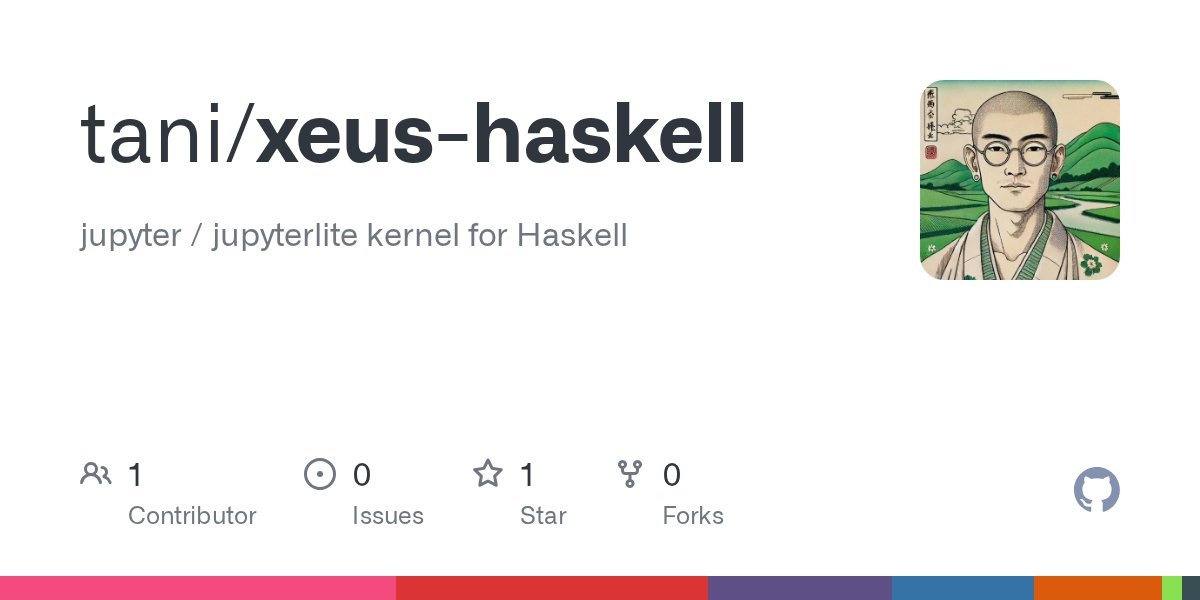xeus-haskell introduces a modern Jupyter kernel for Haskell built on the native xeus protocol, offering developers a performant pathway to interactive computing. The project simplifies installation with conda environments and provides an online binder for immediate experimentation.

For years, the Jupyter ecosystem has been synonymous with interactive computing, yet Haskell—a language revered for its purity and concurrency—has lagged in interactive tooling. Enter xeus-haskell, a groundbreaking kernel that bridges this gap by leveraging the native xeus protocol. This isn't just another wrapper; it's a performant, modern foundation designed to bring Haskell's elegance directly into Jupyter environments, from local notebooks to cloud deployments.
The xeus Revolution
At its core, xeus-haskell is built upon xeus, a C++ library providing a native implementation of the Jupyter protocol. Unlike traditional ZMQ-based kernels, xeus offers direct, efficient communication between kernel and frontend. This native approach promises lower latency and greater flexibility—critical for Haskell's complex type systems and lazy evaluation. For developers, this means smoother REPL experiences and more responsive data exploration within the familiar Jupyter interface.
Installation: Precision Over Convenience
Getting started requires surgical precision due to dependency conflicts. The project explicitly avoids conda packaging, mandating a fresh environment to prevent clashes with zeromq libraries in full Anaconda distributions. The safest path:
mamba create -n xeus-haskell
source activate xeus-haskell
For those compiling from source, the dependency chain is substantial:
mamba install cmake cxx-compiler xeus-zmq nlohmann_json cppzmq xtl jupyterlab -c conda-forde
Then, with careful prefix handling:
mkdir build && cd build
cmake .. -D CMAKE_PREFIX_PATH=$CONDA_PREFIX -D CMAKE_INSTALL_PREFIX=$CONDA_PREFIX -D CMAKE_INSTALL_LIBDIR=lib
make && make install
Pro Tip: Always use
miniforgeorminiconda. Full Anaconda installations will triggerzeromqconflicts that break compilation.
Browser-Based Haskell: No Installation Needed
The most compelling feature is the zero-friction entry point. Thanks to JupyterLite and Binder, developers can experience xeus-haskell instantly in their browser:
This removes all installation barriers, letting newcomers explore Haskell's interactive capabilities without committing to local setup—a game-changer for education and rapid prototyping.
The Technical Backbone
xeus-haskell's reliability hinges on key dependencies:
- MicroHs: The lightweight Haskell interpreter core
- xeus-zmq: Native protocol implementation
- xtl & nlohmann_json: C++ utilities for JSON handling
- cppzmq: ZeroMQ bindings
Each component is meticulously chosen to balance performance with Haskell's functional paradigms.
Beyond the Kernel: Community and License
The project embraces open collaboration, with detailed CONTRIBUTING.md guidelines for developers. Licensed under Apache 2.0, it encourages enterprise adoption while maintaining academic rigor.
As Haskell regains traction in data engineering and formal methods, xeus-haskell arrives not as a novelty but as a necessary evolution. It transforms Jupyter from a Python-centric playground into a truly polyglot environment, validating Haskell's role in modern interactive workflows. For a language long confined to GHCi and Vim, this kernel is its ticket to the interactive big leagues.
Source: xeus-haskell on GitHub

Comments
Please log in or register to join the discussion